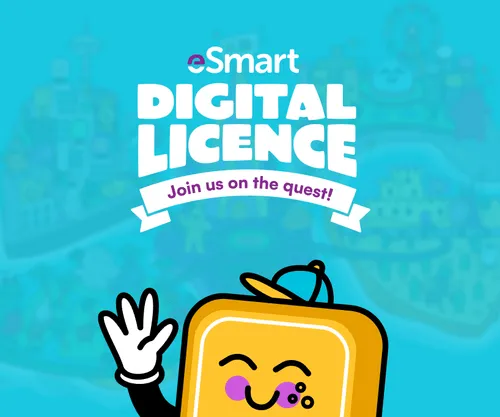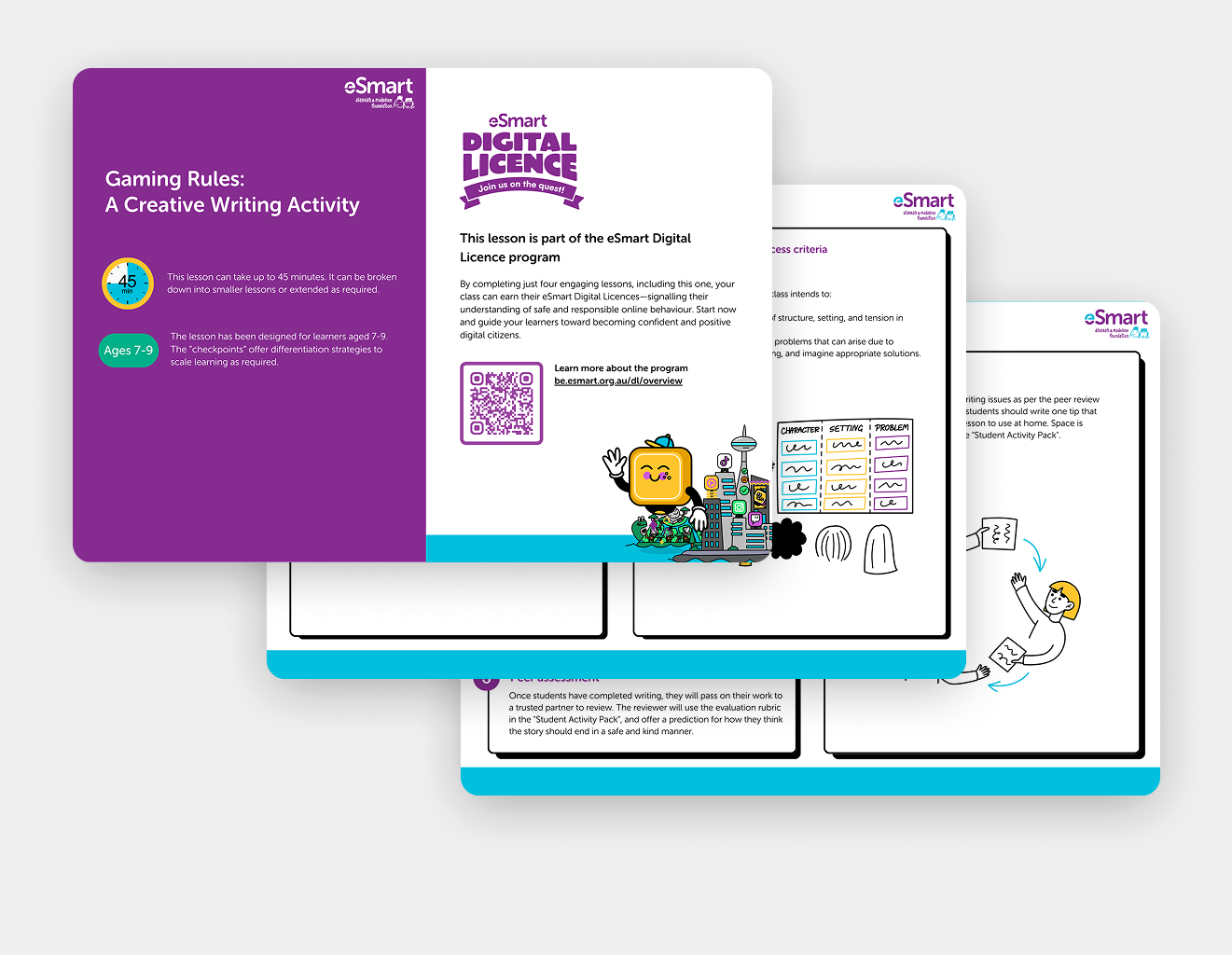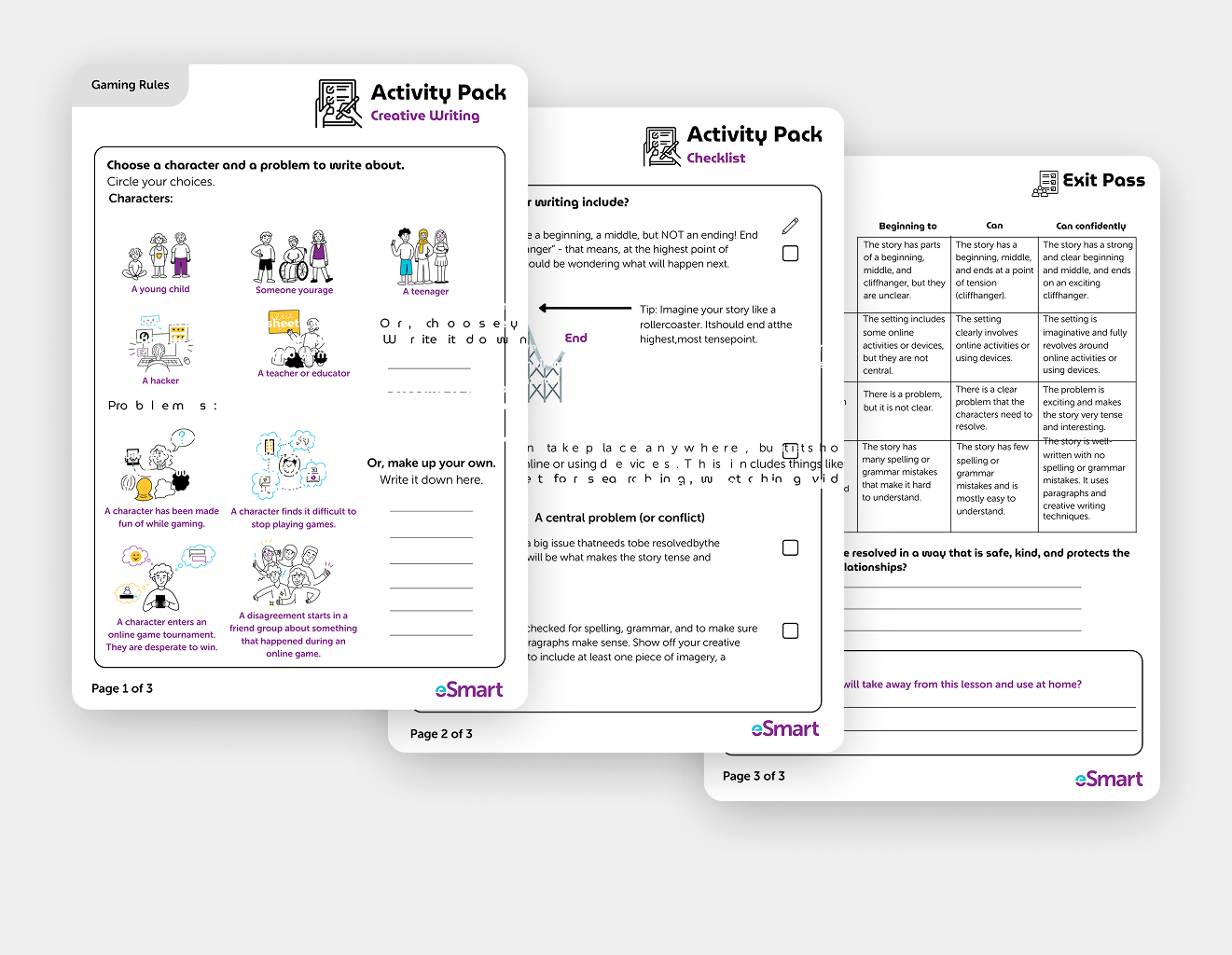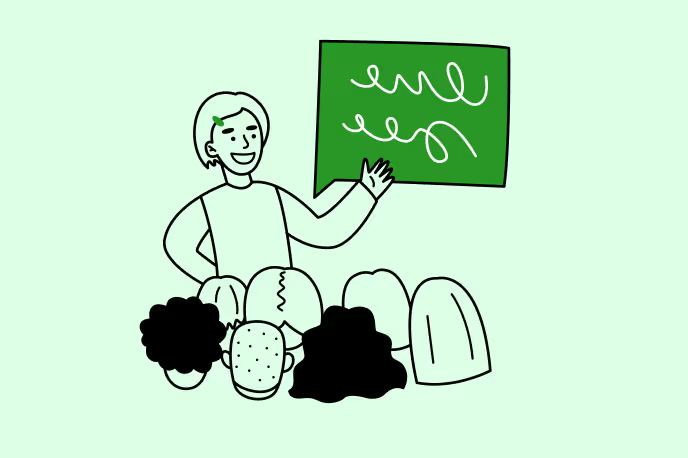Download Lesson Pack
Gaming Rules: A Creative Writing Activity

Child Safeguarding Statement
Some resources and activities may prompt a child to remember and potentially share an experience of harm. Make sure you’re familiar with your school's safeguarding policies and procedures so you can confidently report safety and well-being concerns.
Prepare students for the session by discussing: their right to be safe and respected; what to do if discussing online safety makes them feel uncomfortable or unsafe; and how to seek help if they feel or have felt unsafe. Use this resource available on the website.
Gaming Rules: A Creative Writing Activity
This activity enhances creative writing in the English curriculum, focusing on character development, settings, and plot structures, and is relevant for students engaged in online gaming and social media, addressing respectful relationships and promoting empathy and respect in both online and offline environments.
Lesson details
Conduct
About this Risk Area
The behaviour children and young people engage in online.
Example topics:
- Cyberbullying awareness and prevention strategies.
- Practicing kindness, empathy, and respectful communication online.
- Understanding the consequences of digital actions, including what can be deleted and what cannot be deleted.
- Respecting online community guidelines and fostering a positive online environment.
The resources for this risk area guide positive online behaviours, by promoting kindness, respect, and responsible digital citizenship.
This activity combines creative writing principles with an exploration into the digital citizenship skills required for positive and fulfilling online gaming. Using a series of relevant and timely prompts, students will create imaginative scenarios that lend towards a discussion on respectful and empathetic online behaviour. While gaining a greater understanding of characters, settings, plot structures and language features in creative writing, students will also move towards an understanding of the ways that online behaviours can spiral out to impact offline relationships.
Note: This lesson can be extended to draw up a set of rules for online conduct. Please see the extension to this task for more ideas.
Learning Intentions
By completing this activity, our class intends to:
- Develop an understanding of structure, setting, and tension in creative writing practice.
- Identify common issues and problems that can arise due to conduct during online gaming, and imagine appropriate solutions.
Curriculum alignment
Australian Curriculum (Version 9.0)
The Australian Curriculum outlines the fundamental knowledge, comprehension, and abilities students are expected to acquire as they advance through the initial 11 years of schooling.
General Capabilities: Personal and Social Capability
Emotional Awareness:
- Level 3: Explain the influence that their own behaviour has on the emotional responses of others.
Empathy:
- Level 3: Discuss the value of different needs, emotions, cultures and backgrounds.
- AC9E3LA01: Understand that cooperation with others depends on shared understanding of social conventions, including turn-taking language, which vary according to the degree of formality.
- AC9E3LA02: Understand how the language of evaluation and emotion, such as modal verbs, can be varied to be more or less forceful.
- AC9E3LE05: Create and edit imaginative texts, using or adapting language features, characters, settings, plot structures and ideas encountered in literary texts.
- AC9E3LY06: Plan, create, edit and publish imaginative, informative and persuasive written and multimodal texts, using visual features, appropriate form and layout, with ideas grouped in simple paragraphs, mostly correct tense, topic-specific vocabulary and correct spelling of most high-frequency and phonetically regular words.
- AC9E3LY08: Write words using joined letters that are clearly formed and consistent in size.
- AC9E4LA01: Explore language used to develop relationships in formal and informal situations.
- AC9E4LA02: Identify the subjective language of opinion and feeling, and the objective language of factual reporting.
- AC9E4LE05: Create and edit literary texts by developing storylines, characters and settings.
- AC9E4LY06: Plan, create, edit and publish written and multimodal imaginative, informative and persuasive texts, using visual features, relevant linked ideas, complex sentences, appropriate tense, synonyms and antonyms, correct spelling of multisyllabic words and simple punctuation.
- AC9E4LY08: Write words using clearly formed joined letters, with developing fluency and automaticity.
Years 3 & 4 Health and Physical Education
- AC9HP4P04: Select, use and refine personal and social skills to establish, manage and strengthen relationships.
- AC9HP4P05: Describe how valuing diversity influences wellbeing and identify actions that promote inclusion in their communities.
- AC9HP4P06: Explain how and why emotional responses can vary and practise strategies to manage their emotions.
- AC9HP4P07: Rehearse and refine strategies for seeking, giving and denying permission respectfully and describe situations when permission is required.
- AC9HP4P08: Describe and apply protective behaviours and help-seeking strategies in a range of online and offline situations.
CASEL Framework
The CASEL Framework creates a foundation for applying evidence-based, Social and Emotional Learning (SEL) strategies both at school and in the broader community. Its aim is to support the cultivation of SEL skills and environments that advance students’ learning and development.
- Relationship skills: The abilities to establish and maintain healthy and supportive relationships and to effectively navigate settings with diverse individuals and groups.
My Time, Our Place – Framework for School Age Care in Australia
The aim of My Time, Our Place: Framework for School Age Care in Australia (the Framework) is to assist educators to provide children and young people with opportunities to maximise their potential and develop a foundation for successful lifelong learning. The Framework has been designed for use by approved providers and school age care educators working in partnership with children and young people, their families and the community, including schools.
Outcome 4: Children are confident and involved learners.
Children develop a range of skills and processes such as problem solving, inquiry, experimentation, hypothesising, researching and investigating.
This is exemplified in the activity by:
- The use of reflective thinking to consider how they use digital technology with friends.
- The development of a technology plan that required students to think about their own behaviours.







